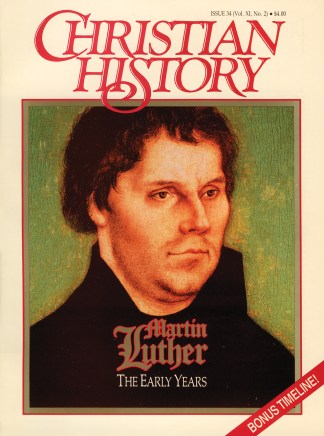“I am the son of a peasant,” Luther once said, “and the grandson and the great-grandson.” Martin’s father, Hans Luder, was indeed of humble peasant stock. But he became a copper-mining entrepreneur. Hans worked hard to climb the social ladder of the middle class. His motto: “A free peasant is nobody’s slave.”
Hans married Margaretha (also known as Hannah) Lindemann, daughter of an established middleclass family that included doctors, lawyers, university professors, and politicians. Martin’s career track of university education (with the goal of practicing law) was probably influenced by relatives on his mother’s side.
Hans was proud when his son earned a master’s degree. He dreamed of Martin’s future career in law and the financial rewards it would bring the family. So he was furious, at least initially, when his son decided to enter a monastery.
When Martin was ordained, Hans attended his son’s first mass. Afterward, Martin asked his father if this new career wasn’t better than being a lawyer. His father rebuked him, “Haven’t you heard the commandment to honor your father and mother?”
Rebellion Against Harshness?
The older biographical portraits of Hans and Hannah were stern, based on a few stray comments from Martin’s later recollections of his childhood. He remembered his father once whipping him so badly that he “ran away and felt ugly toward him” until his father worked to regain the boy’s trust. Martin was also reported by his students to have said: “My mother once beat me with a cane for stealing a nut, until the blood came. Such strict discipline drove me to the monastery, although she meant it well.”
Comments like these led some twentieth-century biographers, influenced by modern psychological theories, to trace Martin’s deep inner conflicts as an adult to his parents’ harshness. Hans in particular was seen as a tyrant who indirectly sparked the Reformation by provoking Martin’s rebellion against authoritarian fathers of all stripes—Hans, the pope, and even God.
More recent scholarship, however, looks skeptically at the conclusions of such “psychohistory.” The severe discipline Martin recalled was common in his day, and numerous other clues from his life show he was highly esteemed by his parents.
Luther was deeply devoted to both Hans and Hannah, and he desired that they approve of his controversial career. Later in his life, when writing On Monastic Vows, Martin dedicated the book to his father. He wrote that his father’s earlier rebuke about honoring parents had been right: “You quickly came back with a reply so fitting and so much to the point that I have scarcely in my life heard any man say anything that struck me so forcibly and stayed with me so long.”
On his way to the ecclesiastical hearing at Augsburg, when he feared the heretic’s stake lay ahead, Luther’s thoughts turned to the welfare of his mother and father. “Now I must die,” he said. “What a disgrace I shall be to my parents!”
Paul Thigpen, a professional writer, is a doctoral candidate at Emory University in Atlanta, Georgia.
Copyright © 1992 by the author or Christianity Today/Christian History magazine.Click here for reprint information on Christian History.









